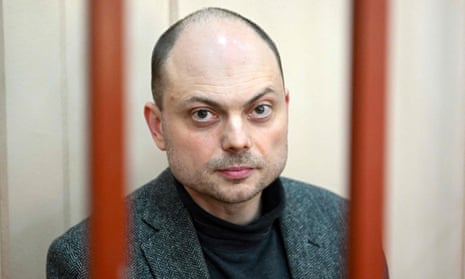A court in Moscow has sentenced the opposition activist Vladimir Kara-Murza to 25 years in prison, in one of the most high-profile cases to date of a Russian dissident being jailed for opposing the invasion of Ukraine.
Kara-Murza, who holds Russian and British citizenship and studied at the University of Cambridge, was detained in April 2022 and charged with spreading false information about the Russian army in Ukraine. He was later also charged with high treason over a series of public speeches he made that criticised Kremlin policies and the war in Ukraine.
Kara-Murza’s sentence is the longest yet given to a political opponent of Vladimir Putin, as the Kremlin further steps up its relentless crackdown on dissent.
In a final speech to the court last week, Kara-Murza struck a defiant tone, declined to ask the court to acquit him, and said he stood by everything he had said. “I only blame myself for one thing,” Kara-Murza, 41, whom Amnesty International has designated a prisoner of conscience, said.
“I failed to convince enough of my compatriots and politicians in democratic countries of the danger that the current Kremlin regime poses for Russia and for the world.”
Kara-Murza’s sentencing, which he compared to Stalin’s show trials, was held behind closed doors.
Speaking to journalists outside the court, the British ambassador in Russia, Deborah Bronnert, said the verdict was “shocking” and called for Kara-Murza’s immediate release.
The UK government also announced that it had summoned the Russian ambassador after the sentencing.
After the verdict, Kara-Murza’s wife, Evgeniya, praised her husband for his “courage, consistency and honesty in your many years of work”.
“I am infinitely proud of you, dear, and I am always there,” she tweeted.
The jailed Kremlin critic Alexei Navalny strongly criticised the ruling, calling it “illegal, unconscionable and simply fascist”.
At the time of his arrest last year, Kara-Murza was one of the few prominent opposition figures who chose to stay in Russia. Most, including allies of Navalny, have fled due to safety concerns since the outbreak of the war.
Hours before his detention, Kara-Murza appeared on CNN where he described the Kremlin as a “regime of murderers”.
after newsletter promotion
In 2015 and 2017, he fell into two separate comas in Moscow after displaying symptoms that doctors said were consistent with poisoning.
Kara-Murza – a close friend of the former opposition leader Boris Nemtsov, who was shot and killed in 2015 – nearly died from kidney failure in the first poisoning, which he blamed on the Kremlin.
Concerns over Kara-Murza’s health have been rising in recent weeks after he was too unwell to attend his hearing last month. His lawyer, Vadim Prokhorov, said in a statement on Facebook at the time that he was being treated for polyneuropathy, which he is suffering from as a result of the two poison attacks.
Kara-Murza is the second high-profile political opponent of Putin to be jailed since the outbreak of the war in Ukraine. In December, the veteran opposition politician Ilya Yashin was sentenced to eight and a half years in prison under similar charges of spreading false information meant to discredit the Russian army.
Almost 20,000 Russians have been detained for antiwar protests, according to the human rights group OVD-Info.
More than 450 people have had criminal cases opened against them for opposing the war in Ukraine, with some facing sentences of up to 15 years for offences as slight as posting anti-war messages on social media, making the past year the most repressive era in Russia’s modern history.
